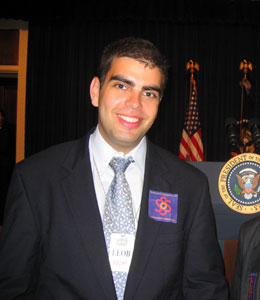INVESTING IN THE FUTURE: HAVERFORD SENIOR'S ORGANIZATION GETS STUDENTS INVOLVED IN SOCIAL SECURITY REFORM

Details
Aside from some economics majors, it seems that most college students find Social Security discussions as fascinating as slow-drying paint. But Patrick Wetherille '06 wants to change that attitude, as co-founder of Students for Saving Social Security (S4), a grassroots organization with more than 200 campus affiliates that mobilizes college students to engage in the Social Security debate. S4's Web site, www.secureourfuture.org, provides up-to-the-minute news, information, and event listings to make students aware of continuing developments in Social Security reform.
Wetherille, a double-major in economics and political science, hadn't been too invested in Social Security issues himself until he studied at the London School of Economics (LSE) his junior year. Last fall, he interned at the White House with the National Economic Council, and was assigned to the top advisor to the President on Social Security policy, Charles Blahous.“It was basically a crash course in Social Security policy for the past 23 years,” Wetherille says.
Shortly after the election, Social Security came to the forefront as a major political issue, and Wetherille was busier than ever. When his internship ended and he came back to Haverford, he felt a kind of withdrawal:“I had been enmeshed in this Social Security web.” During his time in D.C. he became friends with fellow intern Jonathan Swanson, a student at Yale University, and once they returned to their respective schools they would e-mail Social Security-related articles back and forth and indulge in spirited discussions about the issues at hand.
In early March, they both realized that college students were largely uninvolved in the Social Security debates.“Which is odd,” says Wetherille,“because it affects our generation more than any other before us.” Hoping to educate students about the system's imminent reform, the two devised a business plan for S4 and paid one of Wetherille's high school friends to put together a Web site.“It was pure grassroots. Everything we did was through e-mail or the Internet.”
Both men's personal networks were key in recruiting students to set up their own campus chapters of S4.“Besides the Web site, word of mouth has been one of our strongest marketing tools,” says Wetherille.“A lot of my friends happen to be interested in politics, and word travels quickly. It was like a spider web effect.” As the new chapters began hosting events and rallies, the media took notice.
“Our big break came when Fox News wanted to interview us,” says Wetherille.“I had just finished my finals, went to the Fox station in Philadelphia and did a satellite interview. After that, the hits on the Web site increased in volume.”
This summer, the White House showed its own appreciation toward S4:“They liked the fact that we were young people being active on the issue,” says Wetherille. In July, President Bush invited S4's co-founders to meet with him at D.C.'s Old Executive Building, where he gave a speech outlining his perspective on Social Security reform. Treasury Secretary John Snow also spoke.
Wetherille was excited to attend, but also relieved that the event had been downsized from a public rally to a simple, private meeting.“Our style is grassroots, and we didn't want the President to ‘crimp our style,'” he laughs.
S4 is non-partisan and doesn't advocate a specific plan of reform, but both Swanson and Wetherille believe that personal accounts are the best solution because, according to Wetherille, this approach safeguards the money against being spent on other programs.“Right now, we have a trust fund that should be accumulating money to curtail deficits down the road,” he says.“The problem is that the money is being invested in treasury bills, which go straight to the yearly government budget, which can be spent on anything.” The benefit of personal accounts, he explains, is that the money can be spread out: Some can be put in government bonds, some in corporate bonds, and so on.“The stock market has a pretty good history of constantly going up, and providing a better rate of returns than what we're getting through the current system,” he says.
Ultimately, Wetherille believes, fixing the system in the long run requires facing the nation's demographic changes.“Social Security is a fantastic program if you have 20 people working and 20 people paying into a single person's retirement, but when there's only two or three people paying for one person's retirement, you can look at the numbers and know that the money won't be there to support the kind of outlays that are in the budget,” he says.“We're facing a paradigm shift in the way our retirement program has to be structured.”
S4 will be sponsoring more events in the fall as students return to their campuses. Wetherille himself plans to focus less on national efforts and more on the fledgling Haverford chapter, as he works with colleagues to gather signatures for an online petition supporting personal accounts. He's also writing his senior thesis on—what else?—Social Security, approaching the system from a political and historical standpoint. After graduating in December, Wetherille may return to Washington for a few months to oversee the national S4 office. He's also going to apply to graduate school for either political science or economics, and is looking at schools both in the U.S. and abroad:“I'd love to go back to LSE to do a master's degree.”
Whatever the future holds for Wetherille, he's doing his best to see that it will be Secure—Socially speaking.



